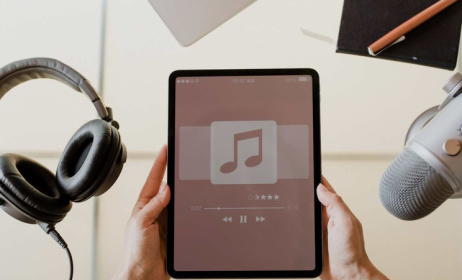Music piracy and royalty collection in Zimbabwe
Music piracy is the copying and distribution of music for which the composer, recording artist, or copyright-holding record company did not give consent. Like many countries, Zimbabwe grapples with growing figures of music piracy every year.
 Photo: Flickr/Muses Touch
Photo: Flickr/Muses Touch
Over the past decade, music piracy has transformed from a small, part-time activity enjoyed by a few music enthusiasts into a booming business and a source of income for many Zimbabweans. In almost every city there are hundreds of vendors selling illegally-produced CDs and DVDs, usually at very low prices. It is possible that up to 85% percent of local music sold in Zimbabwe is illegally produced.
The effects of music piracy are greatly felt by stakeholders in the sector, particularly musicians, record companies, retailers and the government. Musicians, most of whom have lost faith in the formal CD market, are embracing new distribution methods and generally shunning traditional approaches. Top record companies such as Gramma Records, Ngaavongwe Records, Metro and the Zimbabwe Music Corporation (ZMC) no longer print as many copies as they used to ten years ago. This has created a permanent shortage in the formal CD market, which is easily filled by the pirates.
A study conducted by online publication Jive Zimbabwe in 2011, found out that more consumers preferred buying CDs on the streets than from legit outlets. With pirated music CDs averaging between US$ 50 cents and 1US$ per copy (compared to about US$5 for a legit copy), a lot of music retailers that used to exist in the city of Harare such as Spinalong, are unable to operate and have since closed down. With the illegal market more popular now than it has ever been, most musicians have no option but to put their material on that market as well. In 2011 the Zimbabwe Association of Recording Industries (ZARI) introduced a low quality CD called the “budget CD” to lure consumers from the illegal market. Another example is that of prominent gospel musician Kudzi Nyakudya, who was arrested in 2012 for pirating and selling his own music.
It is difficult to ascertain the full impact of music piracy to Zimbabwe’s economy. The obvious reason is that there is no authoritative body that releases music-related statistics in Zimbabwe. Furthermore the country’s economy has experienced significant challenges due to a myriad of factors in recent years. It is estimated, however, that at least 10000 jobs have been lost in the music sector and related industries since the early 2000s. In addition, music sales have significantly declined. Currently popular albums sell between 5000 and 10 000 copies. It is very unlikely that an album will ever sell above the 100 000 mark surpassed by some albums in the past, such as Simbaradzo by Alick Macheso (sold over 300 000 copies), Maruva Enyika by Leonard Zhakata (over 100 000 copies) and Chitekete by Leonard Dembo (over 100 000 copies). With these challenges most musicians balance music with other things to make ends meet. Only well-established musicians such as Oliver Mtukudzi and Alick Marcheso can rely entirely on music.
Anti-piracy measures and royalty collection
Zimbabwe lacks a dedicated anti-piracy organisation, following the closure of the Anti-Piracy Organisation of Zimbabwe (APOZ). APOZ was granted a licence to operate as a copyright watchdog in 2008 but was shut down by the ministry of justice and legal affairs on 26 September 2012, for allegedly supporting pirates. APOZ was founded by Innocent Matsengarwodzi. During its tenure, it worked with organisations such as the Zimbabwe Music Rights Association (ZIMURA), Zimbabwe Union of Musicians (ZUM) and the Zimbabwe Republic Police (ZRP).
With APOZ no longer operating, hopes are on ZIMURA – a collecting society established in 1982. ZIMURA collects and distributes royalties for musical works that have been publicly performed or played. Thus it protects public performance rights, although there are plans to venture into mechanical rights. In addition, ZIMURA holds several copyright awareness workshops throughout Zimbabwe. Current membership stands at around 2000. ZIMURA offers two types of memberships; for composers and publishers. Currently, professionals can apply for ZIMURA membership online at www.zimmusicrights.org. A once-off membership fee of US$50 and US$100 is required for composers and publishers respectively.
Copyright registration and legislation
Currently, no official form of copyright registration is available in Zimbabwe. Zimbabwean copyright laws stipulate, however, that all original music is protected by copyright from the time it is recorded or written down in some format. The copyright legislation in Zimbabwe is mainly composed of two acts; the Copyright and Neighbouring Rights Regulations (2006) and the Copyright and Neighbouring Rights Act (2000). The later stipulates that any person found guilty of infringing the provisions of the copyright law is punishable by imprisonment for a period of two years or a fine. The other laws pertaining to anti-piracy measures and copyright enforcement are: The Intellectual Property Tribunal Act [Chapter 26:06], the High Court Act, the Magistrate Court Act [Chapter 7:10], the Criminal Procedure and Evidence Act [Chapter 9:07], the Competition Act [Chapter 14:28], the Commissions of Inquiry Act [Chapter 10:07] and the Customs and Excise Act [Chapter 23:02].
Zimbabwe is also a member of the International Convention and Treaties on Copyright and Related Rights, the Berne Convention for the Protection of Literary and Artistic Works and the WTO Agreement on Trade Related Aspects of Intellectual Property Rights (TRIPS). The country is also part of the African Regional Intellectual Property Organisation (ARIPO) Development Community.
Useful Contacts:
- African Regional Intellectual Property Organization - Tel: + 263 4 794068; email: gsadyalunda@aripo.org
- Zimbabwe Intellectual Property Office - Century House East, 38 Nelson Mandela Ave, Harare; tel: +263 4 775544-6 / 777372 / 781835
- National Arts Council of Zimbabwe - tel: +263 4 336389 / 304530; email: natarts@zol.co.zw
- Zimbabwe Music Rights Association - tel: +263 33 6185; email: zimra@mweb.co.zw; web: www.zimmusicrights.org
Further reading:
- http://www.techzim.co.zw/2012/05/the-death-of-the-zimbabwean-music-record-company-the-rise-of-the-independent-artist/
- http://www.thenational.ae/news/world/africa/musicians-in-zimbabwe-call-for-new-piracy-laws
- http://www.wipo.int/edocs/lexdocs/laws/en/zw/zw035en.pdf
- http://jivezimbabwe.com/news/94-research/75-jive-zimbabwe-on-music-piracy-in-zimbabwe-pt-1.html
- https://www.google.co.za/search?q=music+piracy&ie=utf-8&oe=utf-8&aq=t&rls=org.mozilla:en-US:official&client=firefox-a&channel=sb&gfe_rd=cr&ei=JLC5U5jwIrDd8gfwloDQDw
- http://www.thezimmail.co.zw/2014/03/06/piracy-a-vampire-bleeding-artistes/
- http://www.herald.co.zw/15-arrested-in-anti-piracy-blitz/




























Commentaires
s'identifier or register to post comments